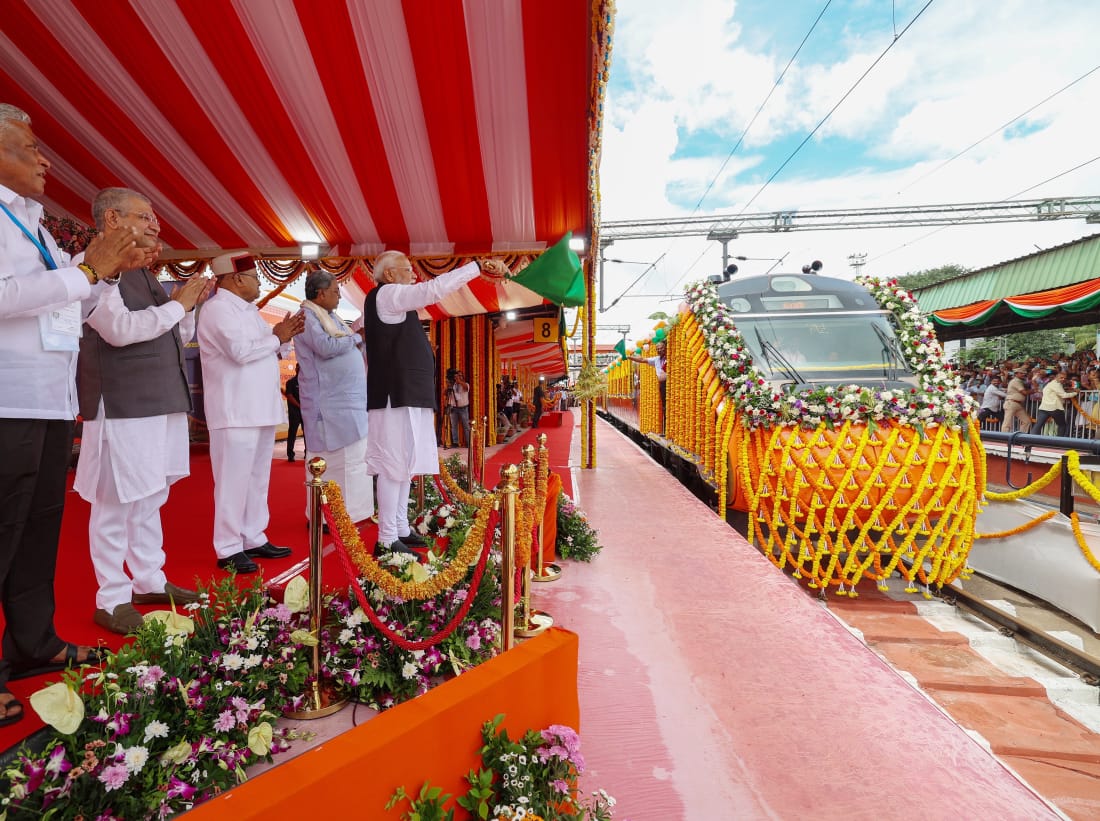
Bengaluru,Prime Minister Shri Narendra Modi inaugurated and laid the foundation stone for metro projects worth approximately ₹22,800 crore during his visit to Karnataka’s capital. The Yellow Line of the Bengaluru Metro, constructed at a cost of ₹7,160 crore under Phase-2, was inaugurated, while the foundation for the ₹15,610 crore Phase-3 (Orange Line) project was laid. The Prime Minister also flagged off three Vande Bharat Express trains—Bengaluru to Belagavi, Nagpur to Pune, and Amritsar to Shri Mata Vaishno Devi Katra—marking another milestone in India’s infrastructure expansion.
Addressing the gathering, the Prime Minister expressed a deep sense of warmth upon arriving in Karnataka, acknowledging the state’s rich culture, the affection of its people, and the sweetness of the Kannada language. Respect was paid to the presiding deity of Bengaluru, Goddess Annamma Thayi, while recalling Nadaprabhu Kempegowda’s vision of a city deeply rooted in tradition and committed to progress. Bengaluru was described as a symbol of the rise of New India—a city that blends philosophical wisdom with technological excellence and has brought pride to India on the global IT map.
Emphasis was laid on the need for strong urban planning and infrastructure to prepare cities like Bengaluru for the future. In recent years, thousands of crores have been invested in the city, and with the Yellow Line operational, areas such as Basavanagudi and Electronic City will now be better connected, reducing travel time and improving ease of living for millions. Upon completion, the Orange Line will work in tandem with the Yellow Line to serve over 2.5 million daily commuters.
A special mention was made of corporate contributions from organisations such as Infosys Foundation, Biocon, and Delta Electronics, which partially funded key metro stations under innovative CSR initiatives.
Referring to Operation Sindoor, the Prime Minister highlighted the Indian Armed Forces’ capability to destroy cross-border terrorist bases and compel Pakistan to surrender within hours, crediting the success to advanced technology and the strength of “Make in India” in defence. Recognition was given to the youth of Bengaluru and Karnataka for their role in this achievement.
India’s rapid economic ascent was underlined, with the nation moving from the world’s 10th-largest economy to the top five in just 11 years and now advancing towards the top three. Infrastructure growth was detailed—India’s metro network has expanded from 5 cities in 2014 to 24 cities covering over 1,000 km, making it the world’s third-largest. Railway electrification has doubled, with over 40,000 km completed in the past 11 years, while airports have grown from 74 to more than 160, and national waterways from 3 to 30.
Healthcare and education expansion was also emphasised—AIIMS institutes have increased from 7 to 22, medical colleges from 387 to 704, and IITs, IIITs, and IIMs have all seen significant growth. Over one lakh new medical seats have been created, offering unprecedented opportunities for the middle class.
The Prime Minister noted that development is reaching the poorest sections of society at the same rapid pace—over 4 crore houses have been built under PM Awas Yojana, with plans for 3 crore more; 12 crore toilets have been constructed, giving dignity and safety to millions of women. India’s total exports have risen from $468 billion to $824 billion, with the country now among the top five mobile handset exporters, and electronics exports increasing from $6 billion to $38 billion. Automobile exports have more than doubled, placing India fourth globally.
The journey towards a developed India was said to be progressing alongside Digital India. The country is advancing in AI leadership through the AI Mission, making strides in semiconductor manufacturing, and becoming a global example for low-cost, high-tech space missions. More than 50% of the world’s real-time transactions now occur in India via UPI, with over 2,200 government services available on mobile platforms.
Technology self-reliance was declared the next major priority, with a call for zero-defect, zero-effect standards in product manufacturing. States were urged to adopt reform-oriented governance, citing initiatives like the Jan Vishwas Bill and the Mission Karmayogi programme for competency-based training of government employees.
The address concluded with a call for collective efforts between the Centre and states to achieve the vision of a developed India, with confidence expressed that Karnataka’s talent will play a key role in this national journey.